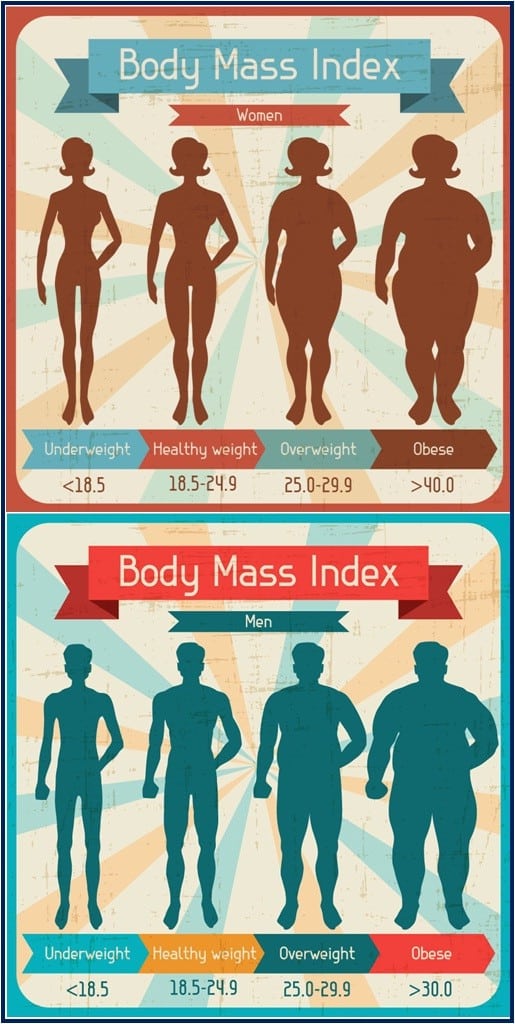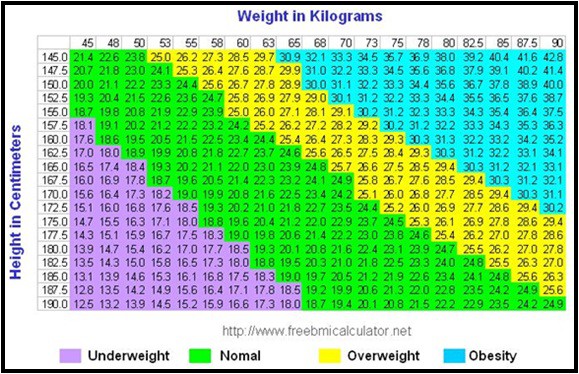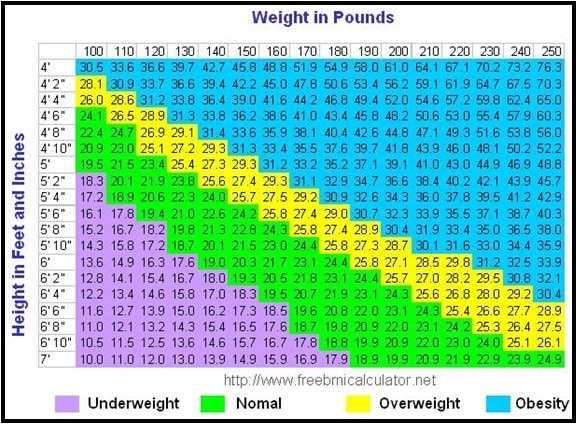What Does Body Mass Index Mean?
Body mass index (BMI) is a measure of body fat based on height and weight for adult men and women.
It’s the body weight in kilograms divided by the square of the body height in meters.
This is a medically accepted measuring standard to know whether a person is underweight, average, or obese.
BMI is beneficial for assessing your weight loss requirements. You can decide on the amount of weight that needs to be shed or how much to put on if you are underweight and want to be healthy.
Manual Calculation Of BMI
There are some methods and formulas for manually calculating BMI. Let us look at the two most commonly used BMI measurement methods.
1. Calculation Of BMI In the Metric System
The calculation of BMI follows a simple metric system.
BMI is obtained by arithmetically dividing the total weight of your body by the squared sum of your height in meters.
Here is an example that will give you a better understanding of BMI measurement in the metric system.
- Height of Mrs. X = 1.9 meters
- Weigh of Mrs. X = 77 kg
- Height Squared = 1.9×1.9 = 3.61
- X’s BMI = 77/3.61 = 21.32
2. BMI Calculation In Imperial System
The BMI computation steps followed in the imperial system of measurements are slightly different from the metric system of measurements.
Step 1: The body’s total weight needs to be multiplied by 4.88, a fixed standard number.
Step 2: The multiplied sum of the body mass in Step 1 needs to be divided by the squared value of the height.
Let us look at a practical example to understand this BMI measurement better.
- Height of Mrs. Y = 5.9 feet
- Weight of Mrs. Y = 160 pounds
- Steps 1 & 2 = 160×4.88 = 780.8
- Y’s Height2 = 5.9×5.9 = 34.81
- Y’s BMI = 780.8/34.81 = 22.43
NB: There are also other formulas used for measuring BMI.
BMI And Weight Categorization
The charts below will help you identify your weight category.
Health Risks Warning From BMI
If your BMI is 18.5 to 24.9, it falls within the normal weight or healthy weight range.
If your body weight falls under the underweight or obese category, you need to change your diet and nutritional habits and, if necessary, get suitable medical treatment. The overweight category is also bad and needs your special attention to reduce body weight.
Your health is in terrible shape if you have a high BMI, above 30. This is in the high-risk category of developing type 2 diabetes, heart disease, high blood pressure, heart attacks, stroke, etc.
The very low body mass index is as dangerous as the obesity category. They are highly prone to all common diseases and general weaknesses.
Is BMI A Reliable Health Indicator?
There is a divided opinion on the reliability of body mass index measurement. Many doctors and health experts say BMI is not a foolproof measurement (bogus) to be relied upon.
There are numerous instances where people appeared to be overweight but continued to live healthy lives with no health hazards.
There are also numerous cases where people with ideal BMI measurements suffer from diseases associated with overweight and obese people.
Another valuable argument against BMI is its generalized results. Body weight is closely related to the body’s bones, muscle mass, fat, and water content.
There are so many who weigh higher because of the large bone structure and heavy macular build-up.
For example, a well-built and muscular athlete cannot be negatively categorized as overweight or obese because of their higher body weight.
However, BMI could be a good indicator of the health conditions of most adults who follow a generic lifestyle.
BMI is not able to precisely pinpoint the amount of fat in the body or the location of the fat.
BMI doesn’t compute and differentiate between lean body mass and fat mass in an individual’s body composition.
Mass fat storage in different parts of the body does not have an equal amount of health hazards associated with it.
Belly fat is more dangerous than fat on the hips.
Some argue that it is better to assess the fat in the body by measuring the waist circumferences in proportion to the height of the person.
Lastly, if you are not an athlete, an older adult, or a teenager, then BMI could give you some basic understanding of the healthiness of your body and body weight. BMI is only an indicator, not a reliable predictor of your health conditions.
Recommended reading list:



